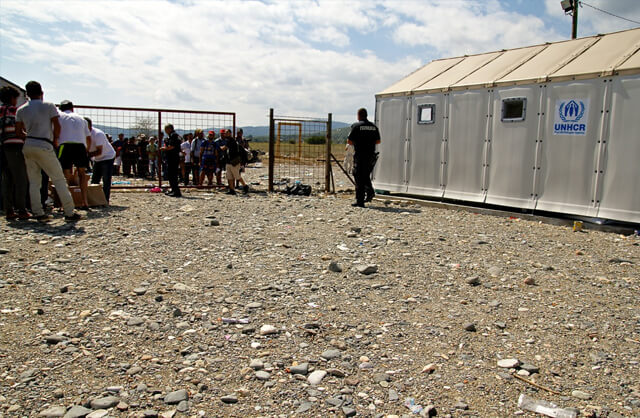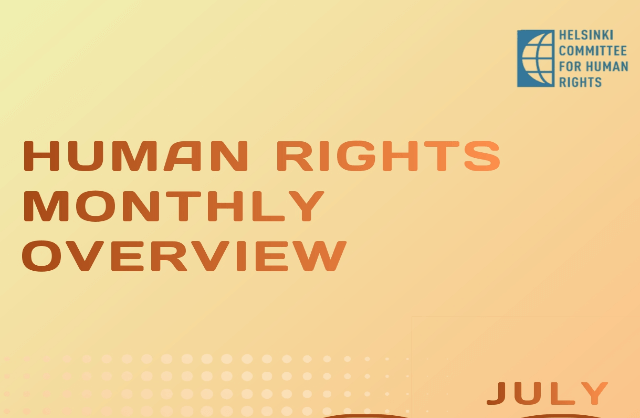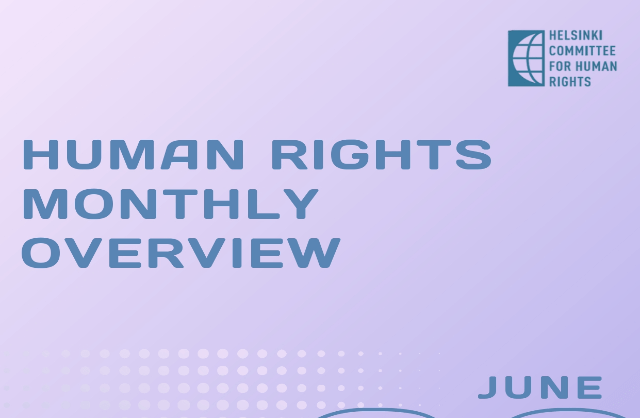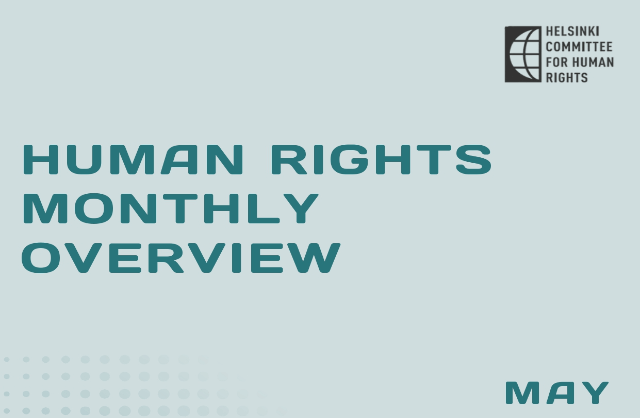The situation at the border crossings Gevgelija and Kumanovo for the period of June, 2017
July 20, 2017

Monthly report for June, 2017 on the situation at the border crossings Gevgelija and Kumanovo includes the following topics: Available facilities and conditions at the camp and Institutional treatment.
Gevgelija
The situation at the Vinojug Camp, Gevgelija, is generally unchanged in comparison to last month, with minor stirrings of a small number of refugees. The number of refugees in the camp is also low and no significant violations of their rights have been observed. The capacities and conditions in the camp are satisfactory, with some rare shortcomings where improvement is possible.
With a decision of the Government of the Republic of Macedonia, adopted on 29.06.2017, the crisis situation in the border areas to the South with Greece and to the North with Serbia was extended until the 31 December 2017.
Available facilities and conditions
The number of refugees in the camp at the start of the month amounted to 9, but by the end of the month it went up to 14, after one family originating from Iraq was held up in the camp, along with one underage person originating from Libya to whom a guardian was appointed.
Due to the high temperatures, the refugees do not move a lot around the camp until the late afternoon hours and mainly stay in their containers. Although the containers are equipped with air conditioning, the refugees complain that they do not have sufficient amounts of summer clothes and footwear. Clothes for the children from the camp were provided with a donation of the Legis NGO.
When needed, the refugees are provided with regular medical check-ups or hospital intervention. Also, they are provided with access to a dentist, and there is also an available a gynecologist for the women who are residing in the camp.
There are regular creative and educational workshops organized for the children in the camp by civil society organizations, as well as excursions to the town in accompaniment of the representatives of the organizations. The adults, on the other hand, have shown interest in taking foreign language courses.
The hygiene in the camp is at a satisfactory level, as the janitors do their job regularly and adequately.
A new team of police officers from Slovakia has arrived in the course of the month.
On 23.06.2017, the Minister of Interior, Oliver Spasovski and the Ambassador of the Republic of Slovakia to the Republic of Macedonia, Martin Bezak, paid a visit to the camp. The goal of the visit was to get acquainted with the situation in the camp and the work of the security teams.
On the 29.06.2017, a larger delegation of police and military officers from the countries from the region paid a visit to the camp, accompanied by Macedonian police and military officers.
Institutional treatment
Over the month of June, 2017, 35 refugees were transported from the Republic of Macedonia to the Republic of Greece, as observed by the Helsinki Committee. Apart from them, a four-member family originating from Iraq and one underage person originating from Libya were admitted and are accommodated in the camp as members of vulnerable groups.
One person originating from Kosovo and two Albanian citizens who were caught by the police were taken to the camp for questioning, whereby they were taken in an unknown direction. Other such cases were noted in the course of the previous month too, and it remains unclear how and why citizens from the neighboring countries get caught entering the country illegally.
In the remaining cases, refugees originating from Afghanistan, Iraq, Pakistan, Iran and Ethiopia were caught, as individuals or in smaller groups of 3 or 4 persons who had lived or resided in Turkey of Greece, whereby they set off on the “Balkan Route” with the help of smugglers. Nearly all of them reached Serbia, but were sent back to Macedonia by the Serbian police after a brief stay there. All of them paid substantial amounts to smuggling groups in order to reach Serbia. After they are sent back to Macedonia from Serbia, they most often voluntarily decide to go back to Greece. There was one characteristic case of a bigger group of 20 refugees of various origins, mainly from Algeria and Morocco, who were caught by the police in the vicinity of Udovo on the night between 23 and 24 June. After they were questioned by the police in the camp, they were transported to Greece in the course of the same night.
Kumanovo
The Reception Transit Center Tabanovce has not undergone significant changes to its infrastructure and available facilities. The number of refugees staying in the camp is low and there are both registered and unregistered refugees among them. No serious violations of the refugees’ rights have been observed over the course of the month.
Available facilities and conditions
The number of refugees in the camp varies from 20 to 25, about 13 of whom are registered, while the remaining ones are unregistered. The unregistered refugees reside in the camp temporarily and their number varies on daily basis, depending on the groups that come and go.
Due to the high temperatures and the Ramazan fasting, the refugees in the camp stay in their containers until the late afternoon hours and the movement in the camp is low.
At the start of the month a decision was taken that disinfection and pest control in the camp are to be carried out regularly every week, due to the occurrence of snakes and rats.
The Crisis Management Center has allowed the non-governmental organizations in the camp to donate food due to the Ramazan fasting. Apart from this, the quality of the food that is regularly served to the refugees has also been improved.
Legis and the other non-governmental organizations working in the camp have held an event on the occasion of the Ramazan Holiday.
Institutional treatment
The Crisis Management Center has informed that they have made a decision for non-selective admission of refugees in the camp, for a longer or temporary stay, provision of food, water and medical aid. This particularly applies to vulnerable groups, pregnant women and children, non-accompanied underage children and people with injuries.
On 05.06.2017 the border police found a five-member family in a truck on the Macedonian-Serbian border in an attempt to cross the border. According to their statements, they paid 5000 EUR to smugglers so that they would be transported to Belgrade. The family was sheltered in the camp. On 08.06.2017, a man and his pregnant wife were admitted to the camp, where the wife immediately had access to a gynecological check-up. They were both accommodated in the camp. By the end of the week, the family left the camp at their own request, in order to go back to Greece. On 17.06.2017, a group of 11 refugees were admitted to the camp, among whom three men, two women and six children. The refugees were sheltered in the camp, but expressed no desire to stay, and wanted to go back to Greece. On the next day a van was organized so that the newly-arrived refugees could go back to Greece.
Smaller groups of refugees can be observed in the vicinity of the camp, although they are not present every day due to the high temperatures. Their admittance to the camp depends on the decision of the police officers who are on duty (although a decision was announced for non-selective reception to the camp), and so the refugees are not always allowed to enter the camp.
In the second half of the month, the number of refugees in the camp increased due to the arrival of several groups who were either admitted or accommodated in the camp, or they briefly left it of their own will after briefly staying there. Thus, two groups arrived on 22.06.2017, one which left the camp at their own will after briefly staying there, while the other group, consisting of three refugees originating from Iran, was admitted and sheltered in the camp. On the next day, on the other hand, two groups arrived once again, one consisting of 9 refugees originating from Lebanon and Iraq, while the other consisting of 5 refugees originating from Iraq. All of them were admitted to the camp and sheltered there. With them, the number of refugees in the camp went up to 35.
Towards the end of the month, the competent institutions in the camp prepared a list of refugees who are willing to go back to Greece at their own request. By 30.06 2017, the transport had been organized, whereby on the next day, a total of 18 refugees went back to Greece in a van.
The situation in the Reception Centers in the Republic of Macedonia
The number of refugees and asylum seekers accommodated in the reception centers is not available.
Irregular migration
In the course of June, the Ministry of Interior did not register any criminal and legal events related to refugees or smuggling groups.


